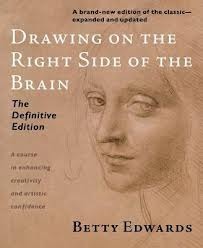More on this book
Community
Kindle Notes & Highlights
DEDICATION
laureate,
gleaned
neuroplasticity.
Albert
Einstein put it best: “The intuitive mind is a sacred gift, and the rational mind is a faithful servant. We have created a society that honors the servant and has forgotten the gift.”
inadvertently
And the five skills, I realized, were not drawing skills in the usual sense;they were rock-bottom, fundamental seeing skills: how to perceive edges, spaces, relationship, lights and shadows, and the gestalt.
gestalt.
Subsequently,
anathema
awash
the arts are the most powerful means of strengthening the perceptual component without which productive thinking is impossible in every field of academic study.
esoteric
panacea
stultifying
dru...
This highlight has been truncated due to consecutive passage length restrictions.
“Over the centuries of history, The Master (the right hemisphere) has seen his empire and powers usurped and betrayed by his Emissary (the left hemisphere).” —Iain McGilchrist, The Master and His Emissary
proclivities
replicate
One of the most encouraging new discoveries that the human brain has made about itself is that it can physically change itself by changing its accustomed ways of thinking, by deliberately exposing itself to new ideas and routines, and by learning new skills.
transmute
deterioration
Surprisingly, people often equate their lack of drawing skill with a lack of creativity, even though they may be highly creative in other areas of their lives. And the importance of perception often shows up in the words we speak, phrases that speak of seeing and perceiving. When we finally understand something, we exclaim, “Now I see it!” Or when someone fails to understand, we say the person “can’t see the forest for the trees,” or “doesn’t get the picture.”
Albert Einstein once defined insanity as “doing the same thing over and over again and expecting different results.” He also said, “We can’t solve problems by using the same kind of thinking we used when we created them.”
apprehend—in short, to intuit, to understand and bring meaning to the fragmented world of the left hemisphere. Teaching for transfer of learning
intuit,
extrapolating
ameliorative
pictographs
cue
laboriously
Paleolithic
inhibiting
antic
Gestalt
“The greatest satisfaction comes from mastering something that is truly difficult.”
verisimilitude.
bond
Graphite
“Then why do it?” you may well ask. The reason is simply this: for a beginning student, drawing a person from memory brings forth a memorized set of symbols, practiced over and over during childhood. While doing the drawing from memory, can you recall that your hand seemed to have a mind of its own? You knew that you weren’t making the image you wanted to, but you couldn’t keep your hand from making those simplified shapes—perhaps the nose shape, for example. This is caused by the so-called symbol system of early childhood drawing, memorized by countless repetitions.
crosshatching,
myriad
depicted,
every style of line is valued, one not more than another.
“The left hemisphere analyzes over time, whereas the right hemisphere synthesizes over space.”
cognate,
Literal
Synthetic
Analogic


